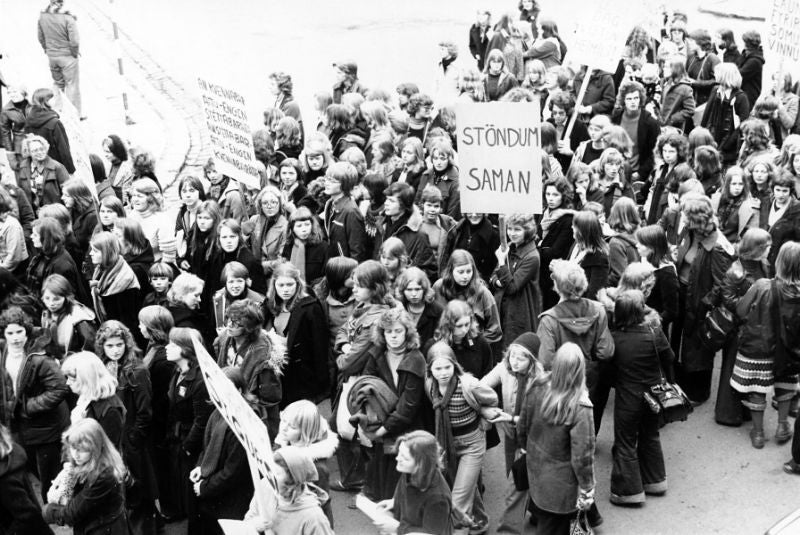Iceland PM to take part in first women’s strike in almost 50 years: ‘Women’s Day Off’
‘Workers from all major industries are taking part: healthcare workers, teachers, service workers, finance workers, care workers, energy workers,’ chair of Icelandic Federation for Public Workers says
Your support helps us to tell the story
From reproductive rights to climate change to Big Tech, The Independent is on the ground when the story is developing. Whether it's investigating the financials of Elon Musk's pro-Trump PAC or producing our latest documentary, 'The A Word', which shines a light on the American women fighting for reproductive rights, we know how important it is to parse out the facts from the messaging.
At such a critical moment in US history, we need reporters on the ground. Your donation allows us to keep sending journalists to speak to both sides of the story.
The Independent is trusted by Americans across the entire political spectrum. And unlike many other quality news outlets, we choose not to lock Americans out of our reporting and analysis with paywalls. We believe quality journalism should be available to everyone, paid for by those who can afford it.
Your support makes all the difference.Tens of thousands of women in Iceland are due to take part in the country’s first day-long strike in almost 50 years to raise awareness of gender-based violence and the gender pay gap.
Katrin Jakobsdottir, Iceland’s prime minister, will participate in the protest, which will involve women and non-binary people stopping paid and unpaid labour on Tuesday.
Workers from a range of sectors have said they will take part in the women’s strike, which is the first day-long protest since 1975, when women also downed tools and stopped work.
Sonja Yr Porbergssdottir, chair of the Icelandic Federation for Public Workers, told The Independent: “Workers from all major industries are taking part: healthcare workers, teachers, service workers, finance workers, care workers, energy workers etc.
“We also expect women and non-binary people on parental leave, the elderly, disabled people and others outside of the labour market to participate.”
She said it is hard to gauge how many people will participate, but explained that more than 25,000 women took part in the 1975 strike, and she hopes that the number taking part in Tuesday’s event will top this figure.
“The support of the women’s strike is widespread – schools are being closed, health services will be at the bare minimum, and major companies have made statements about support, so it will be a major event in any case,” she added.
Ms Porbergssdottir noted that “significant strides” have been made since the 1975 strike, but cautioned that women still earn 21 per cent less than men.
“Occupations traditionally associated with women are consistently undervalued and underpaid,” she added. “Sectors such as cleaning, childcare and caregiving are some of the lowest paid in society, disproportionately affecting women. Furthermore, women still bear the primary responsibility for childcare, perpetuating inequality.”

Ms Porbergssdottir said that the strike also seeks to raise awareness of gender-based violence, as she explained that transgender people, women with disabilities, and women of colour endure higher levels of violence.
The original protest, dubbed “Women’s Day Off” or “Kvennafri” in Icelandic, brought the nation to a standstill as women refused to work, perform childcare, or cook.
Some 90 per cent of Icelandic women are estimated to have stopped work for the day, with schools shut down and flights cancelled due to a dearth of staff.
Children were brought to work by their fathers because of a lack of childcare. The protest triggered far-reaching change in the country: Iceland subsequently elected the first woman to be an elected president in the world, and rolled out its first Gender Equality Act.
BSRB, the country’s biggest federation of public worker unions, along with 31 associations, is taking part in the strike, according to local publication Mbl.is.
“First and foremost, I am showing solidarity with Icelandic women with this,” the country’s prime minister told the news outlet.
The protest’s organisers want the strike to raise awareness of sexual violence and domestic abuse as well as the undervaluing of sectors in which women are over-represented. Campaigners hope more people will participate in Tuesday’s protest than took part in the 1975 strike.
The World Economic Forum recently declared Iceland the world’s most gender-equal nation for the 14th year in a row.



Join our commenting forum
Join thought-provoking conversations, follow other Independent readers and see their replies
Comments